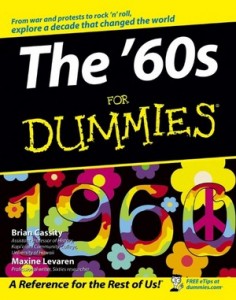I find that the Wylie “Dummies” books are hit-or-miss; it really depends on the rigor and experience of the individual author and, to a lesser extent, the abstraction of the topic. Consistent strong points are a layman’s approach to any subject; you really are getting an introduction that doesn’t require a strong background or special knowledge. Weak points to the “Dummies” books include spotty credentials among some authors and an editing process that often seems haphazard or rushed. Given the abstraction of this subject — the entirety of an American decade — I was reluctant to buy this book. But seeing that it was the one obvious attempt to present the 60s as a whole, from politics to culture, I decided to give it a shot. I’m glad that I did.
While not perfect, “The ’60s for Dummies” is a thorough, engaging, and well-edited addition to the Dummies series. I’m an armchair history nut, so I was mainly reading to fill in some gaps in my knowledge… I was surprised to find that there were many more than I thought. But the book will be equally useful to those who know the sixties as a vague rumor of tumult from the past, or as a special flicker that lights up in the eyes of our older brothers, sisters, aunts, uncles, parents, and grandparents. Maybe you just like the music of the Beatles or that Motown Sound and you want to learn more about their time in the spotlight.
Central to the book’s success is its ambitious scope; it really takes in a lot of territory. Thematically organized, major sections deal with American politics, the civil rights movement, the Vietnam War and public reaction, social justice movements, and American culture. In a book of this length, it isn’t possible to go to great depth on any topic, and yet I was impressed at the thoroughness of the review. Key to this is that the “60s” are treated as a period of change as opposed to a strict decade; this liberated the text to occasionally reach back into the 50s or forward to the 70s as necessary. For example, the political chapter evokes the McCarthy Era of the 50s in talking about Richard Nixon’s rise to power, and the Vietnam War didn’t resolve until will into the 70s. Not only does this overall approach mean that a lot of relevant information is efficiently packed into one book, but it really conveys the essence of the 60s without being preachy. That is, the historical scope of the events of this decade speak for themselves, and the book gives them the space in which to do that.
Just as impressively, the book was well-written and edited. Given the divisiveness of the subject matter (including many issues that continue to divide American society today) it would be easy to lean visibly to the Left or the Right. While there are moments where there are hints of an authorial bias, for the most part, events are presented in a balanced manner. That is, discretion is used in the choice of topics, but readers will be allowed to draw their own conclusions without feeling forced in a particular direction by the book itself. It focuses strictly on argument, action, and reaction. The text was well edited and proofread, sparing me the distracting typos and awkward sentences that often crop up in Dummies books.
I mentioned that the book wasn’t perfect. Sometimes, when describing a momentous historical event, a push for dramatic flair disrupts the otherwise even-handed telling. For example, Woodstock is presented as the ideal of a hippie lovefest as opposed to the chaos of Altamont. Certainly, Woodstock has plenty of problems (and even a few tragedies) of its own. Additionally, while there is a sense of balance throughout in discussion the Antiwar movement, for example, or the second wave of women’s lib, there isn’t as thorough an examination of the backlash. It’s easy to see why; the social status quo is something we tend to take for granted, particularly when someone is rebelling against perceived injustice. Yet the attitudes of Nixon’s “silent majority” was an important aspect of the struggle of the 60s, and a closer look at their anxieties, attitudes, and biases would have lent greater depth to the discussion.
These quibbles shouldn’t keep you from buying and reading this book. The 60s were one of the most transformative decades of the last century, and possibly of all of American history. If you view “The ’60s for Dummies” as an introduction to the subject — not the be-all and end-all — you’ll learn a lot about this fascinating time, and maybe even something about your own place in American history.
